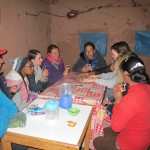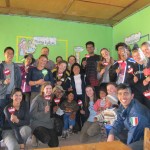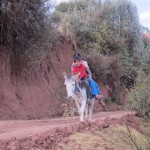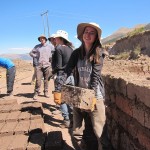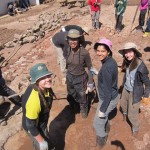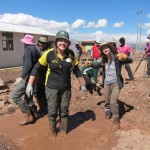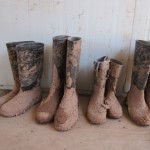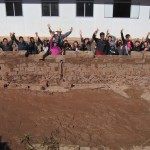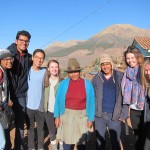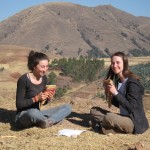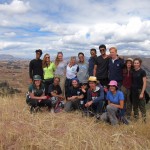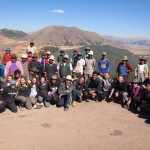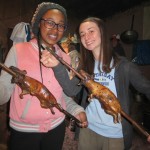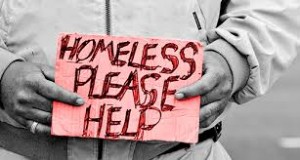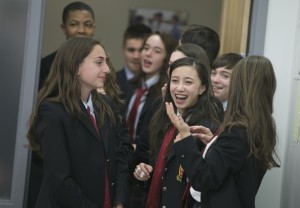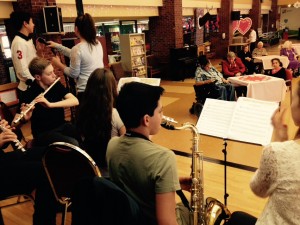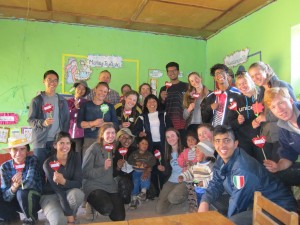
Over the course of my Senior School years, I have been involved in numerous Round Square related activities. In grade 9, I was given a once-in-a-lifetime opportunity to spend six weeks in South Africa on exchange. The following year, I attended an eight-day conference in Los Angeles, which turned out to be equally as memorable. I was, therefore, very excited when I decided to go solo on a three-week service project to Peru this summer.
One heavy bag, two stressed parents and a cancelled flight later, I miraculously ended up in Cusco on July 11. There, I spent the first two weeks with 18 other students who had travelled from all the edges of the world. Along with the two adult leaders, Andy and Nina, we formed team “Llama”.
The two first days were planned primarily for us to acclimatize to the high Cusco altitudes (3,400m) as well as get to know one another. This was accomplished by taking part in creative activities. First, we travelled to a place called Apulaya Music where we spent the entire afternoon learning about Andean art and music. I was taught two new ways to draw: Kaninpacha and Ukupacha, which give life to inanimate objects. As well, I added another instrument (along with the French horn!) to my list of skills by mastering the Andean panpipes, something we all played at the end of the day for our final celebration.
Second, my group and I successfully completed a Via Ferrata, a form of intense rock climbing that has become quite popular in South America. This adventure required us to climb up a 400m ladder that was both vertical and horizontal. Once at the top, we took six zip lines back to the bottom, something I had never done before!
After these orientation days, we were eager to get to work and headed to a town called Kaninchimpa to begin our project. During these eight days, we were split into three local families. My host parent’s names were David and Ophelia. They had a daughter named Olga and a niece named Vanessa. They also had (get ready for this!) a dog, two cats, five cows, five chickens, a dozen lambs, three pigs, two oxen and 60 guinea pigs! Everyday, we’d wake up, feed the guinea pigs, and then walk up to the work site where we’d spend the entire day. Our goal was to build a school on top of the site since the school the children are going to now is extremely far away from their village. To build the school, we first made a solid foundation by digging and filling the holes with rocks and mud. To then build the walls, we had to make bricks (which took four to five days to dry!). This was one of the best parts of my trip as we were given welly boots and had to walk around making mud for hours. This may seem like an easy job (I sure thought it would be at first) but I can assure you it is difficult as the mud is thick and hard to pop in and out of. In fact, one day, my boot got stuck and I ended up walking right into the mud with nothing but my sock! By the end of our trip, we had built half of the school, something we were all very proud of.
Kaninchimpa was certainly my favourite part of the trip. The bond I made with my host family was truly special. Although communicating with them was quite difficult, we tried our best to interact and play with them. I would always help them with dinner, ask them for different words in Quecha and even taught them multiple card games like Uno and Spoons, which became our daily activity. As well, I realized during my stay, that this type of experience was something I knew that I wouldn’t have the chance to do again. That being said, I tried to be adventurous and take advantage of every opportunity and new thing that came my way. For example, despite my small stature, I was always offering to do mud mixing, wheel barrowing and brick carrying. Also, I tried lots of new food (even guinea pig!).
After having worked for eight days straight, we all got to reward ourselves by visiting the one and only Machu Picchu! Team Llama was out in the bus line at 4 am, however, we only started our tour at the site at 7 am. Once the tour was over, I was allowed to spend the entire day (a whole 12 hours on the site) doing whatever I wished. Although I really liked the Inca Bridge and the Sun-gate, simply being there was amazing.
So that is what I did for the first part of my trip with team Llama. The group left on the 25th and, on the 27th, my new team, team Condor, arrived in Cusco. I was with this team for half of their journey as a student leader intern. Now, you may be wondering: what exactly is a student leader intern? I, with three other students that had been with me in team Llama, redid the trip with team Condor. This time, however, we were in charge of running it.
Being a leader is scary enough but I was even more nervous to be a leader in PERU! Nonetheless, the student leaders had an entire day to prepare with our new leaders, Andrea and Freddy. Had it not been for their expert advice and confidence in us, we would not have been able to have done such a good job.
Leading team Condor taught me numerous things about myself. First of all, I was rather nervous about the prospect of leading students my age. My experience was limited to being a CIT for a bunch of 3-6 year olds last summer. Having to lead a group of people my age seemed more difficult, as I wanted them to respect me but at the same time, like me! Also, going into the trip, I did not think I’d make the same bonds with team Condor that I did with team Llama. Needless to say, I was so wrong! I connected with everyone on team Condor just as much. As well, they all felt comfortable enough to come to me for advice and questions, which I really liked.
Secondly, I am considered to be extremely organized. This was both my biggest strength and weakness going into the trip. Let me explain: sometimes, I like to plan out my entire day to the minute. This means that I do not like change. Being adaptable was therefore a strength I wanted to develop. On my day to lead, as usual, things did not go as planned. Two teammates had to go back to Cusco and some people did not have proper equipment. Handling these problems and making changes to the schedule without freaking out was a skill I definitely learned that day.
Lastly, since I had already experienced the trip before, I was considered an expert and, because of this, I didn’t think I’d learn anything new. I was, once again, wrong. With team Condor, I continued to learn and experience more and more things. I did this by asking lots of questions. For example, I learned that some houses in Cusco have two bull statues on their roofs, which stand for protection. Also, at Kaninchimpa, we organized a soccer game with all the local children. That night, we played for hours with the sunset in the background, an image I will not be forgetting anytime soon.
In conclusion, the RSIS 2016 Peru trip has been, like my other Round Square experiences, absolutely incredible. Even though team Llama was great, I thought that my time as a student leader intern was the most memorable and helpful. As I go into my final year at LCC as Round Square Head, I have lots of new ideas and leadership skills that I will most definitely be using because of what I have learned in Peru. I cannot wait for the year to start! – Abby Shine ’17

